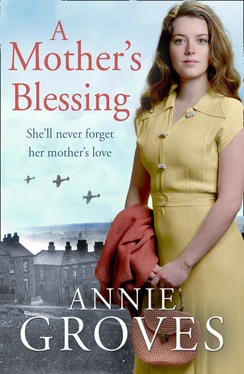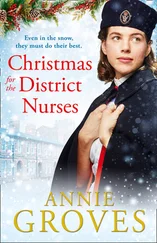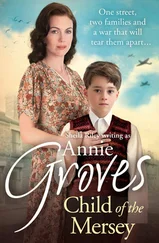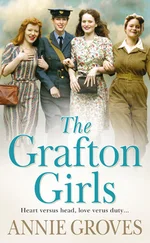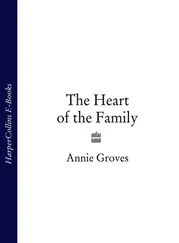When she got in there was no sign of her sister downstairs; even the radio had been turned off, and the table had been laid for breakfast, a task the girls always did last thing before they went to bed.
‘June?’ she called uncertainly from the bottom of the stairs, and then when there was no reply she hurried up, her initial surprise at finding her sister already in bed giving way to anxiety.
‘Are you all right?’ she asked.
‘What’s it to you?’ June demanded truculently. ‘Hours, you’ve been gone, and me here on me own. And me monthlies are giving me a right pain in me belly.’
‘Oh, June, I’m sorry,’ Molly sympathised. Of the two of them, June had always been the one who had suffered more each month. ‘Would you like a hot-water bottle?’
June shook her head, thawing slightly. ‘I’m feeling a bit better now. I’ll come down and ’ave a cuppa, I think. It sounds like Dad’s just come in – you’d better go down otherwise he’ll want to know what’s up.’
Her father was standing in the kitchen, holding a large cardboard box, which he placed almost tenderly on the kitchen floor.
‘What’s in there?’ Molly asked curiously.
‘Tek the lid off and have a look.’
Molly exclaimed in astonishment, as the moment she lifted the lid the kitchen was filled with the sound of cheeping.
‘Day-old chicks, a gross of them, and our Joe’s got another gross as well, and there’s a gross for Pete – seeing as how he’s promised to let us have his horse muck for the allotments. They’re from your aunt’s farm.’
‘What are?’ June asked, coming into the kitchen, her eyes widening as she saw the answer to her question.
‘We’ve clubbed together at the allotments to buy them. With a hundred and forty-four of them we should get a fair few fresh eggs. Only thing is, we need to keep them warm and properly fed for the next few days. I’ve got some mash, to start ’em off, like.’
‘But where will you keep them?’ Molly asked him.
‘We’re going to build a coop for them – I’ve got a bit of wood put by down at the railway yard.’ He winked meaningfully at them and then added, ‘Pete is going to pick it up for us, and once the chicks have grown they can scratch around down the allotments.’ He picked the lid up and placed it over the boxful of chicks, immediately silencing them. ‘And that’s not all,’ he told the girls enthusiastically. ‘We’ve put in to have a pig as well.’
‘A pig?’
‘Aye, it’s a scheme the Government is doing – them as keeps a pig gets ter keep a fair bit of the meat from it, so mek sure you don’t go throwing away any scraps. Oh, and by the way, your Aunt Violet has sent a message to say they’ve got plenty of work down at the farm, if you fancy leaving that factory after all.’
June shuddered. ‘Not likely – remember that time Dad took us there on the train, Molly, and them blinkin’ cows? No, ta! You can keep the country. I’m staying here, even with that Miss Jenner at my throat.’
It was only later, when she was finally in bed and almost asleep, that Molly realised that she hadn’t talked to June about joining the WVS. Oh, well, there was always tomorrow, she decided as she closed her eyes.
FIVE Chapter Five Chapter Six Chapter Seven Chapter Eight Chapter Nine Chapter Ten Chapter Eleven Part Two: Christmas 1939 Chapter Twelve Chapter Thirteen Chapter Fourteen Chapter Fifteen Chapter Sixteen Chapter Seventeen Chapter Eighteen Chapter Nineteen Chapter Twenty Chapter Twenty-One Chapter Twenty-Two Chapter Twenty-Three Chapter Twenty-Four Part Three: October 1940 Chapter Twenty-Five Chapter Twenty-Six Chapter Twenty-Seven Chapter Twenty-Eight Chapter Twenty-Nine Chapter Thirty Chapter Thirty-One Chapter Thirty-Two Chapter Thirty-Three Chapter Thirty-Four Chapter Thirty-Five Chapter Thirty-Six Acknowledgements Keep Reading … About Annie Groves Also by Annie Groves About the Publisher
The bright morning sun blazed down from a cloudlessly blue sky. It was far too hot to wear winter clothes but, nevertheless, the three of them had put on their darkest things and their father was even wearing a collar and tie. People looked curiously at them when they got on the bus but they ignored their sideways looks. They had made this journey five times a year since Rosie’s death: on Mothering Sunday, on the anniversaries of her birth, her marriage and her death, and at Christmas. Now their coming here had gathered its own small rituals: the flowers they brought – daffodils on Mothering Sunday, the roses that bore her name and which she had carried in her wedding bouquet on her birthday and the anniversary of her marriage, violets in February, when she had died, and at Christmas a home-made wreath of holly and ivy to lay on the cold stone – their visit to their own church before they left; their silence like the silence of the cemetery where their wife and mother was buried close to her parents and to her parents-in-law.
This morning, though, the cemetery wasn’t silent. Instead, a group of men were moving and extending its boundary, whilst others were excavating the hard-packed earth.
Molly looked questioningly at her father. ‘Are they going to turn it into allotments, do you think, Dad?’
‘I don’t think so, love. More like they’re getting ready for a different kind of crop,’ he told her heavily. ‘Just in case, like …’
All the colour left her face as she realised what he meant. She looked from him to the bare stretch of land and then at the cemetery, visually measuring the grave-covered earth to the land that lay beyond it – land she now realised was being set aside for new graves.
A mixture of shock, fear and pain filled her insides. It was something she had not allowed herself to think of – the human cost of war. Tales of the Great War seemed from a different age.
‘Surely there won’t be so many,’ she whispered.
Her father’s mouth twisted. ‘This is nowt to them as died last time.’ His haunted expression aged his face. He had never told his daughters of the horrors he had witnessed in the trenches of France: of how he’d had to drink filthy, muddy water just to stay alive; of how he’d had to strip a dead soldier of his ammunition while he was still warm; of how he’d seen his best friend blown to pieces right beside him. ‘A load of cardboard coffins we had shipped in on one of t’trains this week. There was talk as how the ice rink is going to be used as a morgue, if’n Hitler drops his bombs on us. Lorra rubbish. If’n he does it won’t be whole bodies as they’ll be buryin’.’
Molly shivered, her eyes widening in fear. ‘Don’t talk like that, Dad,’ she begged him.
When he looked at her Molly realised that he had momentarily forgotten her and that he had been back in the past and his dreadful experiences of the last war. He squeezed her hand and kissed the top of her head, just like he had done when she was a child and had fallen over and scraped her knee.
‘Don’t you worry, love. With lads like Frank and Johnny to look out for us, we’ll be just fine,’ he assured her, although in his heart he felt mounting anxiety.
Sombrely the three of them made their way along the familiar footpath until they came to Rosie’s grave. For once, even June was silent. The grave was marked with just a simple headstone, but at least she was with those she had loved and who had loved her, and as a child Molly had taken comfort from that knowledge.
One by one they kneeled down and offered up their flowers and their prayers. Molly could see that their father was trying not to cry.
Afterwards, though, when they made their way home, it was the sight of that empty land waiting to receive the bodies of those who were still alive that occupied Molly’s thoughts and tore at her heart. For the first time she knew properly what it was to be afraid of war and death. So many graves; so many people who were going to die. She looked at her father and her sister, anguish inside her. It wasn’t just the men abroad. What if one of them …?
Читать дальше
